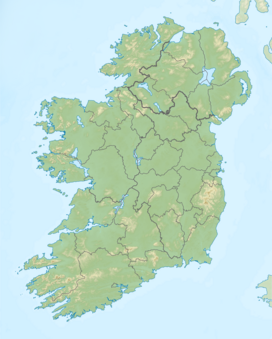|
Croghan Mountain
Croghan Mountain, also known as Croghan Kinsella or Croghan Kinshelagh[2] (Irish: Cruachán Uí Chinnsealaigh, meaning 'little stack of the Kinsella family')[3] at 606 metres (1,988 ft), is the 211th–highest peak in Ireland on the Arderin scale,[4] and the 258th–highest peak on the Vandeleur-Lynam scale.[5][6] Croghan is situated at the far southeastern end of the Wicklow Mountains on the County Wicklow and Wexford border, in Ireland.[6] NamingThe fuller name comes from the Uí Chinnsealaigh, who were the dominant gaelic family in the area; and is used to differentiate it from other "Cruachan" mountains.[3][7] HistoryThe Wicklow gold rush of 1795 began after gold was discovered on the northern slopes of the mountain during tree felling.[8][9][10] GeographyCroghan is situated at the far southeastern end of the Wicklow Mountains on the County Wicklow and Wexford border, in Ireland.[6] Croghan is separated from the main range on its own small massif that includes neighbouring Croghan East Top 562 metres (1,844 ft) (which gives Croghan the profile of a "double peak"), and Slievefoore 414 metres (1,358 ft) to the east. Croghan is the source of the River Bann with rises from its southern slopes.[6] Raheenleagh Wind FarmThe eastern side of Croghan contains the Raheenleagh Wind Farm, which was a 32.2 MW Coillte-ESB Group joint venture project that opened on 20 September 2016.[11] The wind farm was constructed in an existing Coillte forest, and consists of 11 Siemens Wind Power (108 – DD – 3.2MW) wind turbines.[11] The project received planning permission in 2012, and a 17-month construction process started in mid-2015.[11] In 2018, it was reported that Coillte had sold their 50 percent stake to Greencoat Renewables.[12] See also
References
Sources
Bibliography
External linksWikimedia Commons has media related to Croghan Mountain.
|
||||||||||||||||||||||||||||||||||||





